“American Nightmare”: Where Are Denise Huskins and Aaron Quinn Now After the 'Gone Girl Kidnapping'?
Authorities thought Denise Huskins' abduction was a hoax after she was kidnapped from her boyfriend's home
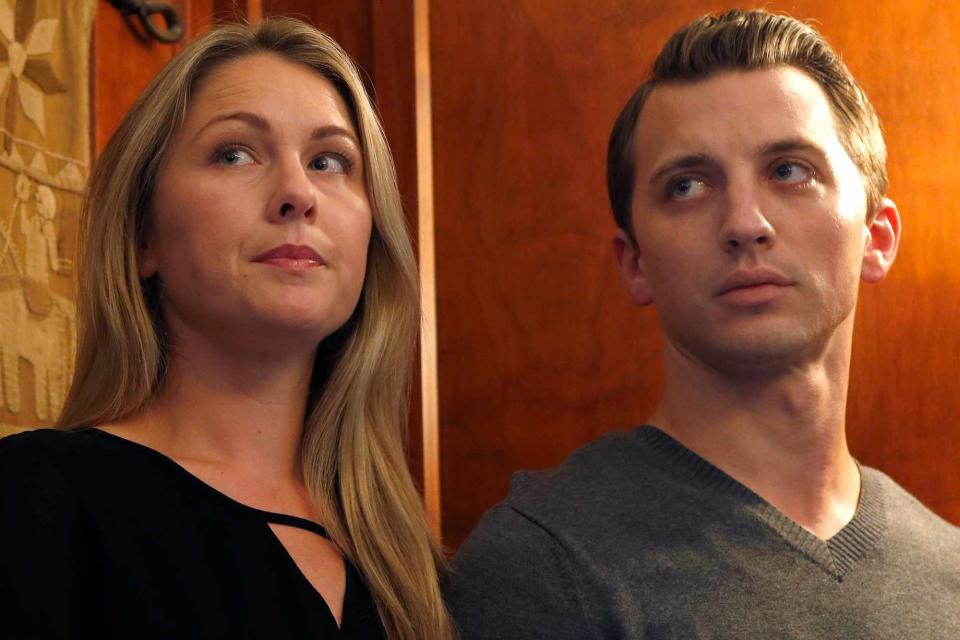
Paul Chinn/The San Francisco Chronicle via Getty
Denise Huskins and Aaron Quinn appear at a news conference with attorney Doug Rappaport (left) in San Francisco, Calif. on Thursday, Sept. 29, 2016.Denise Huskins and Aaron Quinn survived a harrowing kidnapping in March 2015, only to be re-traumatized when they were accused of faking Huskins' abduction in a case known as the "Gone Girl kidnapping."
The difference between the actual case, which is the subject of the Netflix docuseries American Nightmare, and the Gillian Flynn novel and hit Ben Affleck thriller? Huskins' kidnapping was real.
Quinn reported Huskins' abduction to the police, explaining that she'd been held for a total ransom of $17,000. Similar to how investigators and the world saw Affleck's Nick Dunne in Gone Girl, police initially accused Quinn of murdering Huskins and using the kidnapping story as a coverup.
After Huskins, seemingly unharmed, escaped from her attacker two days later, police in Vallejo, Calif., publicly alleged that she and Quinn fabricated the entire incident as a hoax and condemned them for allegedly wasting public resources and time on the investigation.
It wasn't until one detective connected Huskins' kidnapping to a different attempted kidnapping in another California city that the couple were vindicated — and the actual perpetrator was brought to justice.
Find out where Denise Huskins and Aaron Quinn are now, as well as the truth behind the "Gone Girl kidnapping."
What was the 'Gone Girl kidnapping?'
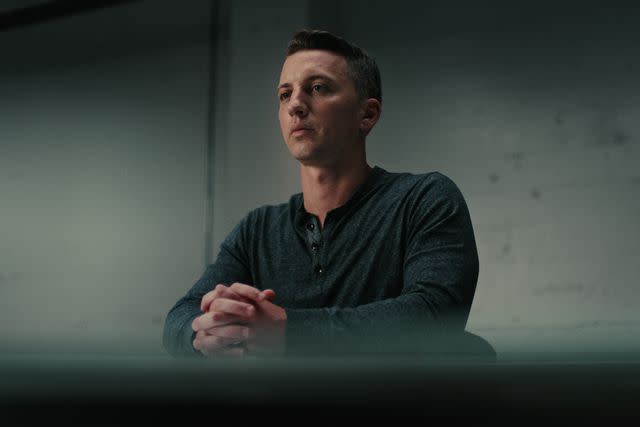
Courtesy of Netflix
Aaron Quinn in 'American Nightmare'.On March 23, 2015, Quinn and Huskins were asleep in Quinn's home when at about 3 a.m. a man broke into their home and woke them up. The intruder ordered Huskins to bind Quinn with zip ties, then bound Huskins himself and put blacked-out swimming goggles and headphones playing recorded messages on the couple, Quinn recalled to ABC News. The intruder then forced the couple to ingest a sedative, threatening to give it to them intravenously if they refused.
The intruder informed Huskins and Quinn that she'd be taken for 48 hours and ordered Quinn to stay within a taped-off area of his home and to correspond with the intruders via text and email regarding ransom. The attacker said that cameras were watching and that if Quinn called the police, he'd kill Huskins.
After waking up from the sedative the next afternoon, Quinn, fearful of being surveilled if he called police, called his older brother, who worked as an FBI agent. His brother instructed him to immediately call 911. Quinn followed his directions.
When police arrived at Quinn's home, it had been about nine hours since the abduction, and they questioned him as if he were a suspect in his girlfriend's disappearance, he told ABC News. Investigators asked if Quinn was on drugs, to which he responded that he'd been drugged by the intruder, and also questioned Quinn as to why he waited several hours before calling them to report the incident.
Quinn went with investigators to the police station to give a formal statement on the incident. In interrogation footage from American Nightmare, one of the detectives in the case, Matthew Mustard, asked Quinn if he was cheating on Huskins and about the status of their relationship. At one point, Mustard tells Quinn, "I don't think you’re being truthful, and I don't think anybody came into your house." Mustard accused Quinn of harming Huskins and said that Quinn would look like a "monster" the longer he waited to tell police officers the truth.
An FBI agent administered a lie detector test, which they alleged that Quinn failed, and repeatedly accused Quinn of harming Huskins, which he vehemently denied. In American Nightmare, it was later revealed that the results of the polygraph exam were actually inconclusive. Altogether, Quinn was held for questioning for 18 hours.
The following day, Huskins contacted The San Francisco Chronicle with a proof-of-life message. Police then brought Quinn back to the station to record a response for the kidnappers.
On March 25, 2015, Huskins resurfaced, alive and seemingly well, in Huntington Beach, more than 400 miles from Vallejo.
What happened to Denise Huskins after she was abducted?
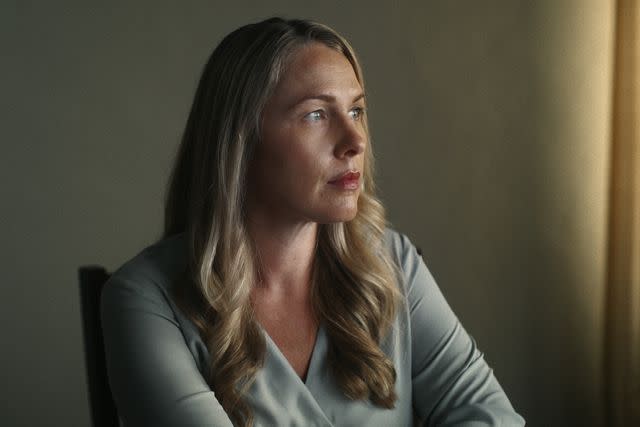
Courtesy of Netflix
Denise Huskins in 'American Nightmare'.In American Nightmare, Huskins recalled in harrowing detail that her attacker raped her twice while she was being held for ransom. She said that after he assaulted her the first time, she told her captor how she'd been sexually abused as a child, hoping that it would deter him from doing so again, but that he still raped her a second time. She said that he recorded videos of both incidents, telling her that he'd release the footage publicly if she spoke to police about what happened to her.
Huskins also said that her captor told her that he was part of a larger organization and that there were other men involved with her abduction.
When she was released in Huntington Beach, Huskins said she was still somewhat sedated from drugs her attacker gave her that day.
After she was released, she said that her attacker told her that she couldn't tell police that he was in the military, nor that she "had sex" with him, and that he would always be watching her. As a result, she said she feared telling authorities initially that she'd been sexually assaulted for fear of putting herself, Quinn or her family in danger.
What did the police do after Denise Huskins was found?
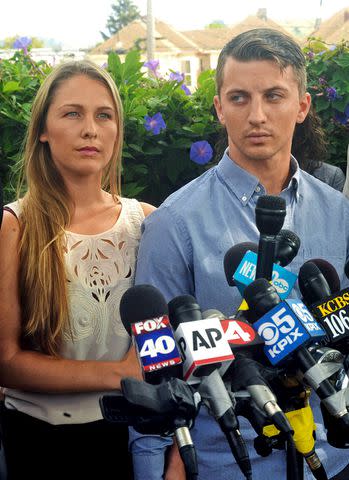
Mike Jory/The Times-Herald via AP
When Huskins reappeared unharmed, the Vallejo Police Department held a press conference admonishing Huskins and Quinn for what they alleged was an "orchestrated event and not a kidnapping."
"Mr. Quinn and Ms. Huskins have plundered valuable resources away from our community and taken the focus away from the true victims of our community while instilling fear among our community members," Vallejo P.D. spokesman Lt. Kenny Park said at the time (via ABC News). "So, if anything, it is Mr. Quinn and Ms. Huskins that owe this community an apology."
She and Quinn each hired defense attorneys, despite not committing any wrongdoing. Huskins' attorney alleged that the Vallejo P.D. delayed issuing a sexual assault exam for forensic evidence, though the Vallejo police denied the claim.
Huskins and Quinn, both physical therapists, said in American Nightmare that in addition to the trauma they endured, they had also feared losing their jobs over the allegations that they'd fabricated the kidnapping.
"You go through something like that, and every moment, every ounce of energy is about 'How do I live to see another second?' That is all you can think about," Huskins told ABC News. "The last thing that you're thinking about is, 'If I do survive, I need to make sure that I'm believable.' "
While the Vallejo police doubted Quinn and Huskins' accounts of the kidnapping, their attacker sent letters to The San Francisco Chronicle saying that Huskins, whom he identified as "Victim F," was telling the truth.
"Ms. Victim F was absolutely kidnapped," one letter read in part. "We did it. … We would rather take the chance of revealing the truth than live in a world where someone like Victim F is victimized again."
How did the Gone Girl kidnapper get caught?
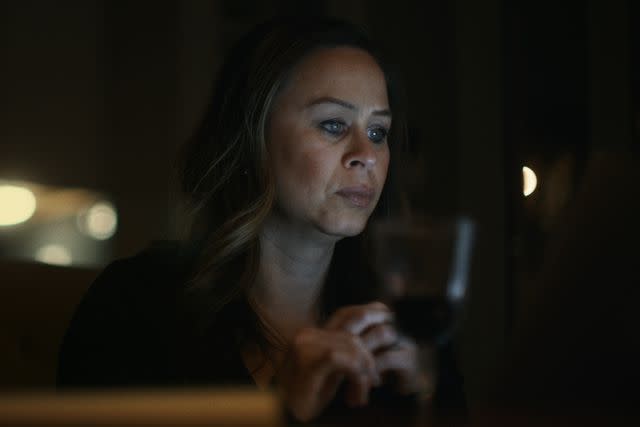
Courtesy of Netflix
Misty Carausu in 'American Nightmare'.In Dublin, Calif., 40 miles from Vallejo, a couple woke up in the middle of the night on June 5, 2015, to an attacker shining a light in their faces. The woman ran into the bathroom and called 911 while her husband fought the attacker off. Though the attacker escaped, he left a cellphone and other evidence, including zip ties, duct tape and a glove, behind.
Huskins and Quinn call Misty Carasau, the investigator who cracked the case — her very first as a detective — their hero. She traced the cellphone from the scene and found it was registered to the stepfather of a man named Matthew Muller. She reached out to other Bay Area law enforcement agencies, NBC Bay Area reported, and found that he was a suspect in a home invasion robbery in Palo Alto, Calif., in 2009. Carasau found a pair of swimming goggles blacked out with duct tape and a blond hair attached and flagged it to the FBI, noting that he may have been Huskins' kidnapper.
On June 8, 2015, the Dublin police arrested Muller for the local home invasion case, and the FBI apprehended him later that month after finding evidence, including Quinn's laptop, in Muller's home that linked him to Huskins' abduction.
"If Misty didn't connect Muller to us, I have no idea where we'd be," Quinn said in American Nightmare. "We're lucky out of this."
Who was the Gone Girl kidnapper?
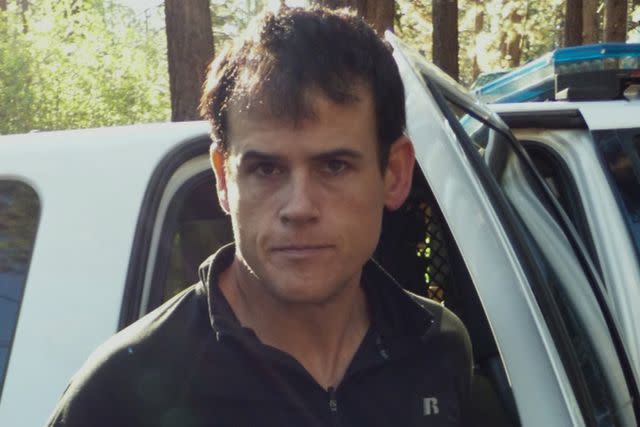
Courtesy of Netflix
Matthew Muller in 'American Nightmare'.Muller is a former Marine and Harvard Law-educated immigration attorney. He told authorities he suffered from "Gulf War illness," which the National Institute of Health says includes symptoms like mood and affective problems, cognitive impairment, fatigue and disrupted sleep patterns, as well as physical signs like respiratory and gastrointestinal issues. Muller's attorney later claimed that Muller was diagnosed with bipolar disorder.
Muller was reportedly disbarred in the state of California after accepting a $1,250 advance from a client and failing to secure a green card for their son, the Associated Press reported.
In September 2016, Muller pleaded guilty to one count of federal kidnapping, admitting that he used audio recordings (to make Huskins believe he wasn't working alone), blacked-out goggles, liquid sedatives and other tools in Huskins' abduction. He was sentenced to 40 years in prison.
Muller also faced state charges of kidnapping, burglary, robbery and two counts of rape by force, but in November 2020 was deemed incompetent to stand trial for that case. In 2022, however, he was deemed mentally fit, and pleaded guilty to those charges.
Muller remains in prison on federal charges.
Where are Denise Huskins and Aaron Quinn now?
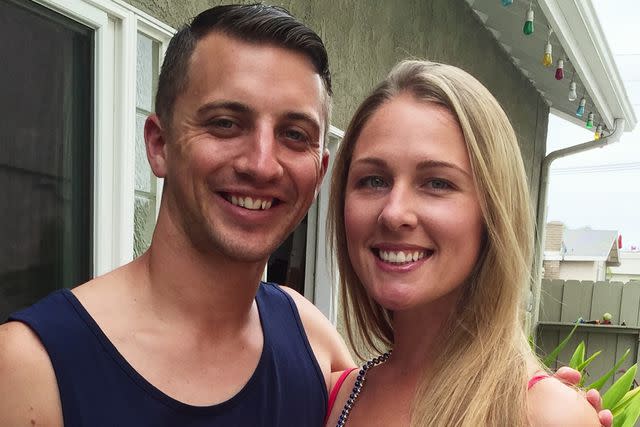
Courtesy of Netflix
Aaron Quinn and Denise Huskins.Quinn and Huskins sued the city of Vallejo in September 2015 for false imprisonment, defamation, false arrest and intentional infliction of emotional distress. In the suit, Quinn and Huskins alleged that the police department "destroyed their reputations through an outrageous, completely unprofessional, and wholly unfounded claim of disparagement."
In 2017, Huskins spoke out about harassment she suffered following the Vallejo police's allegations that she lied about her abduction, saying that she received numerous triggering messages on social media accusing her of fabricating the kidnapping.
Quinn and Huskins reportedly settled with the city in 2018 for $2.5 million.
"The Huskins Quinn case was not publicly handled with the type of sensitivity a case of this nature should have been handled with, and for that, the City extends an apology to Ms. Huskins and Mr. Quinn," representatives for the City of Vallejo wrote in a statement to PEOPLE. Vallejo police chief Shawny Williams, who was not chief at the time of the abduction and its immediate aftermath, also issued an apology to the couple on behalf of the department for how they were treated.
Quinn and Huskins married on Sept. 29, 2018. They released the book Victim F: From Crime Victims to Suspects to Survivors, which they wrote with former PEOPLE senior writer Nicole Weisensee Egan, in 2021.
In March 2020, Quinn and Huskins welcomed their first daughter, Olivia. Their second child, daughter Naomi, was born in November 2022.
"It feels like our family's complete," Quinn said in American Nightmare.
"I want them to know their value and to never let anyone dictate that or determine that for them," Huskins said of her daughters. A tearful Quinn added, "More than anything, I just hope that they grow up to be like their mom. And if they do that, they'll be OK."
While talking to PEOPLE in January 2024, Quinn said they want to become "part of the solution" in helping others who have been wrongfully accused.
“We hope to do more speaking, whether it's with law enforcement, survivors, nurses, doctors, anyone who might come into this situation and work with victims or deal with these kinds of cases and just share what we went through, the bigger themes that a lot of other survivors go through,” Huskins added. “And hopefully collaborate and try to figure out a better strategy.”
A few months later, Huskins appeared on Call Her Daddy, where she spoke candidly about how a work of fiction — referring to the film Gone Girl — influenced the Vallejo police.
"When law enforcement goes to fiction and uses that as a measure to judge people, that's where it's really terrifying," she said. "I finally watched Gone Girl probably nine months after the kidnapping. [Authorities] believed what they believed, and whatever I did or said was only going to fit that box."
Why did Matthew Muller target Denise Huskins and Aaron Quinn?
Despite moving on with their lives, Quinn and Huskins were plagued by one outstanding question with their case: why did Muller target the couple?
Speaking to PEOPLE ahead of the release of American Nightmare, Quinn and Huskins shared that while they're still in the dark about their intruder's motivations, they've accepted they might never get an answer.
"Like many victims, or many people who have gone through tragedy, you don't get all the answers,” Quinn explained. "And that can be a sticking point to recovery. So for us, we don't rely on finding those answers, but what we have to do is move forward in the unknown and focus on things that matter the most to us, like our family, our kids, our work. Those are sustainable things. And having the answers of why they targeted us doesn't change what we do as far as moving forward.”
If you or someone you know has been sexually assaulted, please contact the National Sexual Assault Hotline at 1-800-656-HOPE (4673) or go to rainn.org.
For more People news, make sure to sign up for our newsletter!
Read the original article on People.

